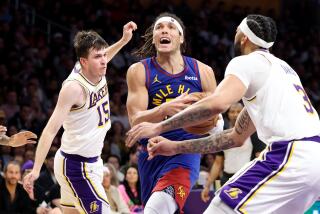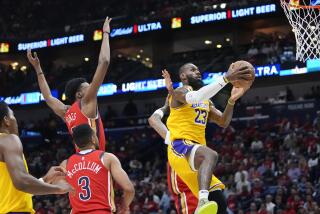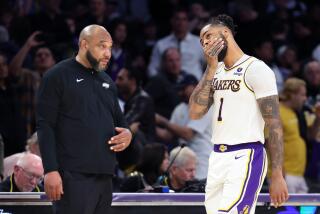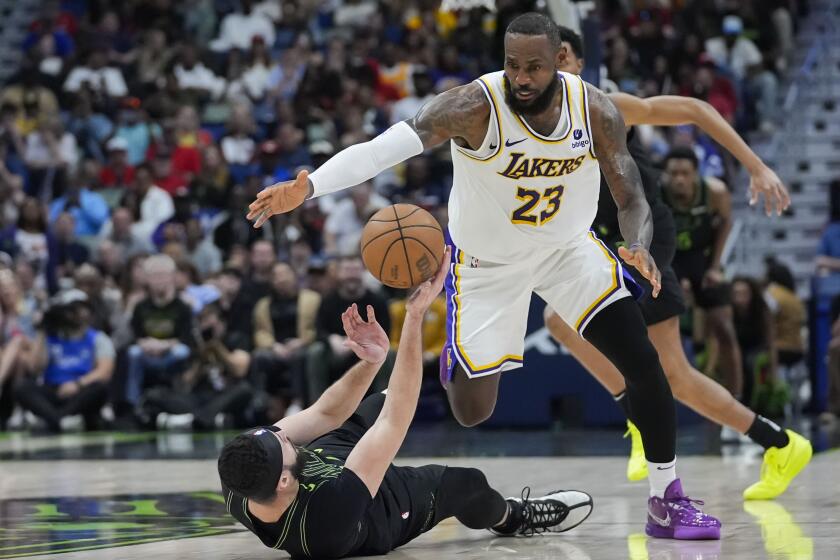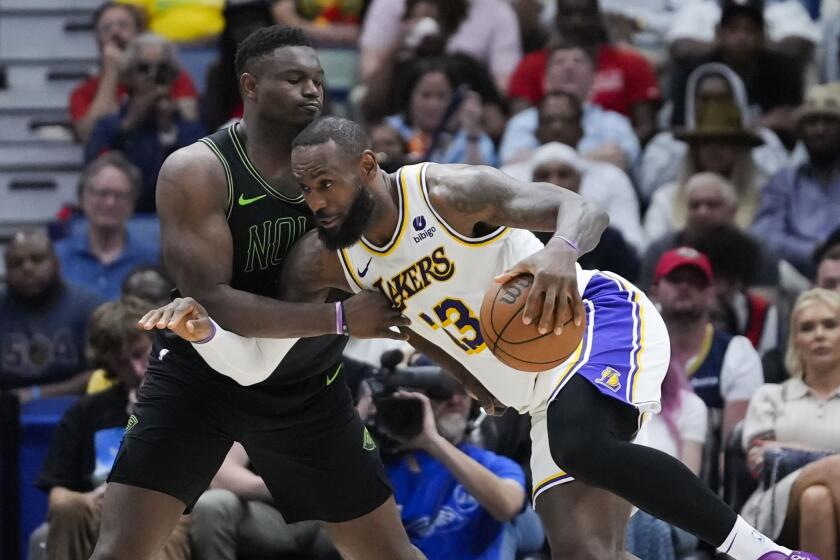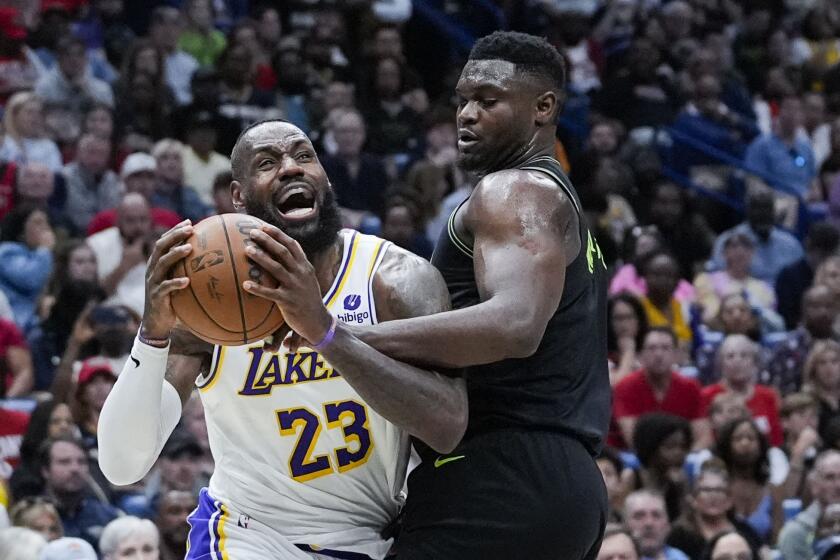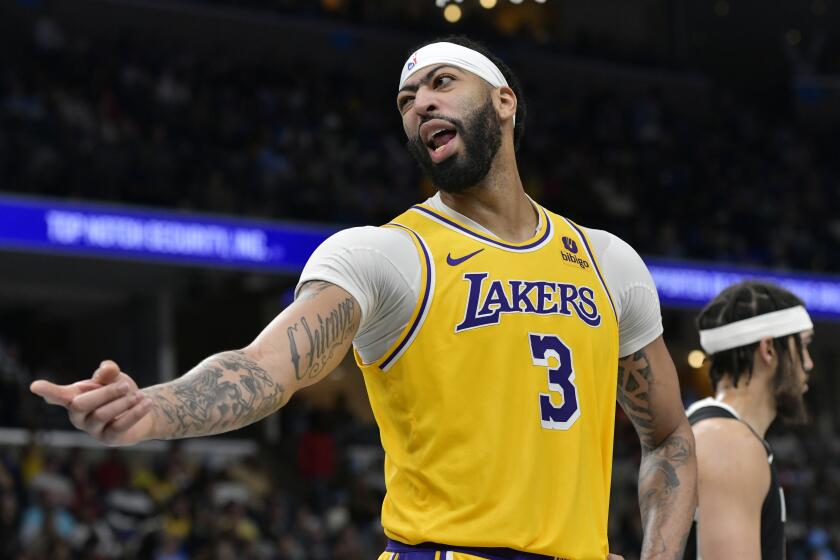Kobe still plays well in L.A., but how about in Peoria?
San Francisco had Barry Bonds. L.A. has Kobe.
Everywhere else in the land, folks couldn’t understand why all those people in San Francisco were standing and cheering for Bonds.
I know how most folks in L.A. feel about Kobe.
He threw a major league tantrum last summer when the Lakers wouldn’t give him Jerry West, or better players in exchange for Andrew Bynum, and then he cried louder, insisting that he be traded.
He called Jerry Buss an idiot, and insinuated the same about Mitch Kupchak.
Mention any of that now and Lakers fans giddy with the team’s success are quick to e-mail and say Bynum and the team wouldn’t be as good as they are today had Kobe not motivated everyone to improve.
Try calling your boss an idiot.
Last summer, Plaschke was writing that Kobe should be granted his wish and traded elsewhere. Now giddy with the team’s success, he’s leading the campaign to anoint him the league’s MVP.
You hit a lot of home runs for a city and all that matters is how good it makes people feel. You score lots and lots of points in thrilling fashion and so it goes.
But I wonder how Kobe, the L.A. beloved, is playing elsewhere?
Is Colorado ancient history for the folks in Nebraska, Florida and Maine? Does the image of a selfish basketball player, advanced in part by Phil Jackson’s book and the split with Shaq, linger?
“He still struggles,” said Matt Delzell, senior client manager for the Davie Brown talent agency, which ranks athletes and celebrities in eight categories to determine their viability as endorsers.
“Kobe has a high awareness number, so people know who he is, but when it comes to trust, appeal, influence and such things, he scores below the average score for everyone else in seven out of seven categories.”
Obviously, outsiders don’t know our Kobe like we know our Kobe, and sometimes when I type I feel as if my fingers are not attached to my body.
“People are not as aware of LeBron James,” Delzell added, “but those who do know him think more highly of him, and perceive him to be more trustworthy and worthy of being a spokesman candidate.”
Or, as Darin Davis from the sports agency Millsport put it, “He’s done plenty on the court, but the overall perception of the one-man team and Colorado hasn’t changed too much. He would be somebody we would typically stay away from.”
But isn’t the number of Kobe jerseys sold across the country a good indication of his overall popularity?
“I happen to think jersey sales are the No. 1 metric measure of popularity,” said CNBC.com sports business columnist Darren Rovell. “It’s not a poll, it’s voted on by money spent, and Kobe is right there,” second only to Kevin Garnett.
Rovell said Kobe’s 81-point game put him back on the court with fans across the country, “but he’s still missing that blue chip, non-basketball-related endorsement.”
When Kobe went crying and kicking into the summer, did it wipe out any advancements made in recapturing a positive image?
Rovell and Henry Schafer, who gives Q ratings analyzing the popularity of celebrities, agree the outburst remained an L.A. story rather than something to further irritate folks nationally.
As for his overall standing across the country, Schafer, executive vice president of Marketing Evaluations in New York, said, “Kobe is certainly coming back among sports fans, but he’s still a polarizing sports figure.”
Take 10 sports fans, he said, and ask them if they are aware of Kobe, and 85% will say they are. The others presumably are bowlers -- never leaving the alley.
Kobe’s familiarity number is the highest in the NBA, while someone as popular as James has a familiarity ranking around 70%. Wouldn’t you like to meet three out of 10 sports fans who have never heard of James?
When it comes to the most likable players in the NBA, while not necessarily the most familiar to sports fans, Tim Duncan and Steve Nash lead the pack with positive Q numbers around 30, followed closely by Dwyane Wade and Shaq.
The calculations go through the end of 2007, with Kobe’s positive Q at 22. Garnett, James and Dirk Nowitzki all have higher positive numbers than Kobe, which make them more appealing to advertisers.
Kobe’s negative Q of 36 puts him second only to the most disliked player in the league, Ron Artest.
“But that’s an improvement from when his negative reaction went through the roof,” Schafer said. “It’s slowly starting to calm down. After Colorado, he was the most hated personality in sports, and while people will never forget Colorado, time almost heals all.”
I DIGRESS here just for a moment. Kobe’s negative Q is only slightly better than David Beckham’s, who I am told is a soccer player. Beckham’s negative Q is 33, his positive 14, with a 65% familiarity rating. I remember when someone in this town said Beckham was bigger than Tiger Woods (90%) and Michael Jordan, No. 1 in Q ratings for something like the last 15 years.
“Beckham’s familiarity with sports fans increased when he came to the U.S.,” Schafer said, “but his appeal here didn’t change much.”
Amen.
EVERYONE AGREES, if the Lakers continue their winning ways and Kobe’s name doesn’t appear on a police blotter again, sports fans around the country will probably embrace him almost as much as L.A. fans have.
“No matter what people think he did, the public is forgiving,” Rovell said.
“Time can be his friend,” Delzell said. “And he’s so good -- he’s easy to forgive.”
We sure do love our athletic heroes when everything’s going good, and things couldn’t be going any better for the Lakers.
Hard to believe right now Kobe Bryant could do anything wrong.
--
T.J. Simers can be reached at t.j.simers@latimes.com. To read previous columns by Simers, go to latimes.com/simers.
More to Read
All things Lakers, all the time.
Get all the Lakers news you need in Dan Woike's weekly newsletter.
You may occasionally receive promotional content from the Los Angeles Times.
